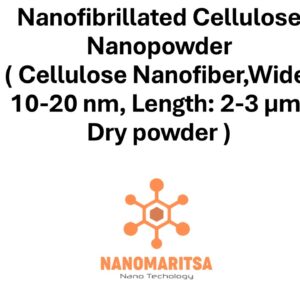Nanocrystalline Cellulose (NCC) in Aqueous Suspension, 6% wt is a high-performance, sustainable nanomaterial derived from renewable cellulose sources. This suspension contains 6% weight of nanocrystalline cellulose dispersed in water, providing excellent mechanical strength, surface reactivity, and biocompatibility. NCC’s unique properties make it an ideal material for applications in advanced composites, coatings, biomedical fields, and energy storage technologies. Its renewable nature and eco-friendly processing further enhance its value as a sustainable material.
1. Key Properties
High Aspect Ratio: Nanocrystalline cellulose features nanoscale width and a high aspect ratio, providing excellent reinforcing properties in composites and formulations.
Colloidal Stability: The aqueous suspension is highly stable, enabling uniform dispersion of NCC in various matrices and systems.
Surface Chemistry: NCC contains hydroxyl groups on its surface, making it reactive and easily functionalized for tailored applications.
Mechanical Strength: NCC has remarkable tensile strength and stiffness, significantly enhancing the mechanical properties of materials.
Renewable and Biodegradable: Sourced from natural cellulose, NCC is eco-friendly and biodegradable, aligning with sustainable manufacturing practices.
Optical Clarity: Suspensions of NCC are transparent, making them suitable for optical films and coatings.
2. Applications
Advanced Composites: NCC is used as a reinforcing agent in polymer composites, enhancing strength, durability, and thermal stability in automotive, aerospace, and structural materials.
Coatings and Films: NCC improves the mechanical and barrier properties of coatings and films for packaging, electronics, and optical applications.
Biomedical Applications: NCC’s biocompatibility and tunable surface chemistry make it suitable for drug delivery systems, wound dressings, and tissue engineering scaffolds.
Energy Storage: In batteries and supercapacitors, NCC enhances the performance of separators and electrodes by providing mechanical integrity and ion-conducting pathways.
Food and Pharmaceuticals: NCC acts as a stabilizer, thickener, and emulsifier in food products and pharmaceutical formulations.
Paper and Textiles: It is used to improve the strength, durability, and surface properties of paper and textile products.
Nanotechnology Applications: NCC is incorporated into nanostructured materials and devices to leverage its mechanical and optical properties.
3. Advantages
Eco-Friendly and Sustainable: NCC is a renewable and biodegradable alternative to synthetic materials, reducing environmental impact.
Superior Reinforcement: Its high strength-to-weight ratio makes NCC an excellent additive for lightweight and durable composites.
Easy Dispersion: The aqueous suspension ensures uniform distribution of NCC, simplifying its integration into various formulations.
Customizable Surface: The reactive hydroxyl groups on NCC enable functionalization to meet specific application requirements.
High Barrier Properties: When incorporated into coatings and films, NCC improves resistance to gas, moisture, and chemical permeation.
Biocompatibility: Its safe and non-toxic nature makes NCC suitable for biomedical and pharmaceutical applications.
4. Recent Trends and Research
Sustainable Packaging Solutions: NCC is being developed for biodegradable and high-barrier packaging materials to replace plastics.
Energy Applications: Research focuses on using NCC in advanced batteries, including solid-state and flexible energy storage systems.
Biomedical Advancements: Studies explore NCC’s potential in smart drug delivery, bioactive wound dressings, and scaffolds for tissue regeneration.
Functional Coatings: Efforts are underway to incorporate NCC into coatings with advanced properties such as hydrophobicity, self-healing, and antimicrobial effects.
Hybrid Nanomaterials: Combining NCC with other nanomaterials, like graphene or carbon nanotubes, is being explored to create multifunctional composites.
5. Future Prospects
Next-Generation Composites: NCC’s superior reinforcing properties will drive its use in lightweight, high-performance composites for automotive, aerospace, and construction industries.
Sustainable Packaging: The adoption of NCC-based biodegradable packaging materials will grow as industries move toward reducing plastic waste.
Advanced Energy Storage: NCC’s role in improving the safety and efficiency of energy storage systems, particularly in flexible and solid-state batteries, will expand.
Biomedical Breakthroughs: Its biocompatibility will support innovations in regenerative medicine, implantable devices, and smart biomaterials.
Environmental Applications: NCC will see increased use in water purification and environmental remediation technologies due to its high surface area and reactivity.
Nanocrystalline Cellulose (NCC) in Aqueous Suspension, 6% wt combines sustainability, mechanical strength, and versatility, making it a transformative material for diverse applications. Its renewable nature and compatibility with modern technologies ensure its continued importance in advancing sustainable and high-performance solutions.
| Measurement (ml) | 100 ml, 500 ml, 1000 ml |
|---|




